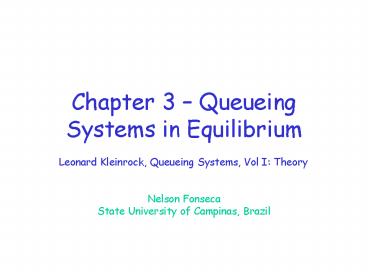Chapter 3 PowerPoint PPT Presentation
Title: Chapter 3
1
Chapter 3 Queueing Systems in Equilibrium
- Leonard Kleinrock, Queueing Systems, Vol I
Theory - Nelson Fonseca
- State University of Campinas, Brazil
2
3. Birth-Death Queuing Systems in Equilibrium
Equations
Transient solution Solution in equilibrium can
not be generalized
3
3.1. Solution in Equilibrium
Whereas pk is no longer a function of t, we are
not claiming that the process does not move from
state to state in this limiting case The
long-run probability of finding the system with k
members will be properly described by pk
4
Flow rate into Ek ?k-1pk-1 ?k1pk1 Flow
rate out of Ek (?k ?k)pk In equilibrium
(flow in flow out)
5
Rather than surrounding each state we could
choose a sequence of boundaries the first of
which surrounds E0, the second of which surrounds
E0 and E1, and so on, we would have the following
relationship
6
(No Transcript)
7
Is there a solution in equilibrium?
Ergodic S1 lt ? S2 ? Recurrent null S1
? S2 ? Transient S1 ? S2 lt ?
8
The MM1 queue
9
Using
we have
10
(No Transcript)
11
(No Transcript)
12
(No Transcript)
13
(No Transcript)
14
- Probability of exceeding ? geometrically
decreasing
15
- 3.3. Discouraged Arrivals
16
(No Transcript)
17
- 3.4. MM8 (Infinite Server)
18
(No Transcript)
19
- 3.5. MMm (m Server)
20
(No Transcript)
21
(No Transcript)
22
- Pqueueing probability that no server is
available in a system of m servers. Erlangs C
formula ? C(m,l/m)
23
- 3.6. MM1k Finite Storage
- K1 - Blocked calls cleared
24
(No Transcript)
25
(No Transcript)
26
- 3.7. MMmm m-Server Loss System
27
(No Transcript)
28
- 3.8. MM1M
29
(No Transcript)
30
- 3.9. MM8 M
31
(No Transcript)
32
- 3.10. MMmKM
33
(No Transcript)
34
Problem 3.2
- Consider a Markovian queueing system in which
- Find the equilibrium probability pk of having k
customers in the system. Express your answer in
terms of p0. - Give an expression for p0.
35
- Solution
36
- So
- Note for 0alt1, this system is always stable.
37
Problem 3.5
- Consider a birth-death system with the following
birth and death coefficients - Solve for pk. Be sure to express your answers
explicitly in terms of l, k, and m only. - Find the average number of customers in the
system.
38
- Solution
- Here we demonstrate the differentiation trick
for summing series (similar to that on page 69).
39
- Since
- we have
40
- Thus
- and so
41
- (b)

